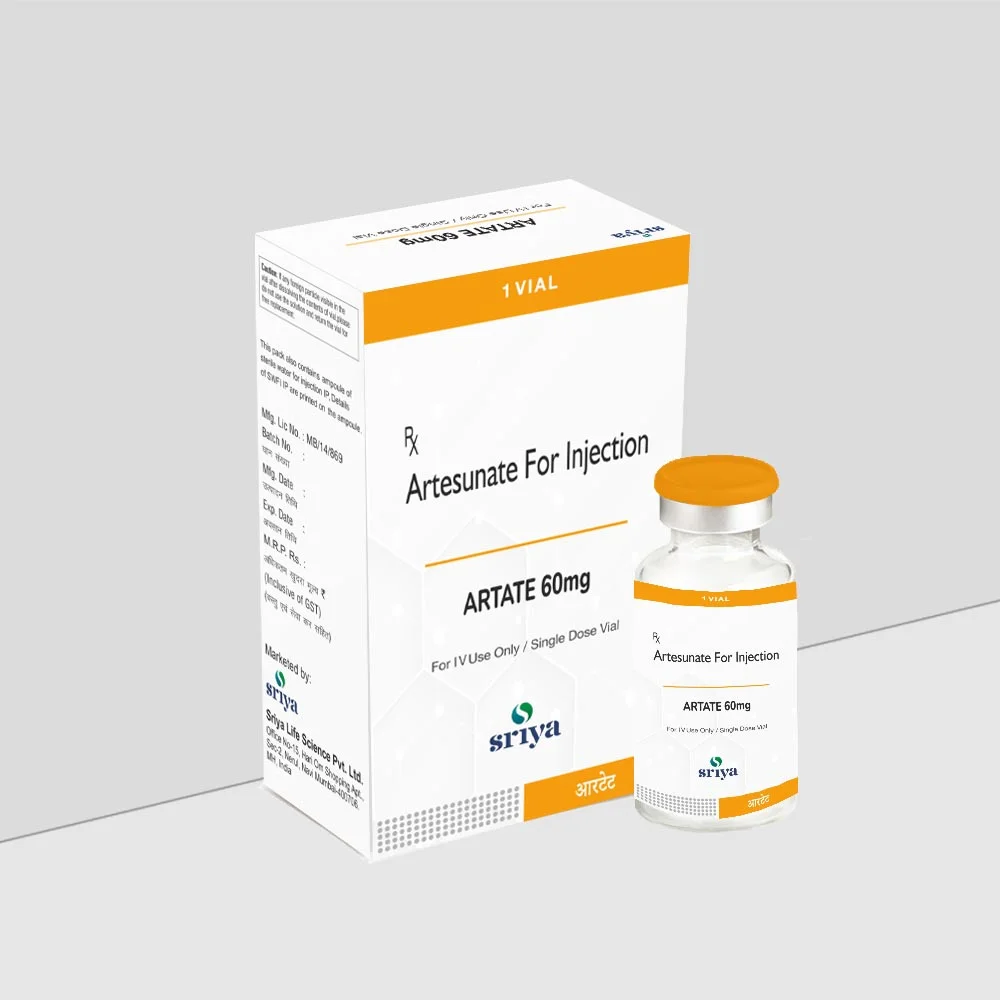Artesunate Injection
|
Generic Name |
Artesunate |
|---|---|
|
Strength |
60 mg / 120 mg |
|
Form |
Injection |
|
Packaging |
Vial |
|
Therapeutic use |
Anti-Malarial |
|
Manufacturing Period |
30 to 45 Days |
Available Composition of
| Name | Strength | Therapeutic use | View More |
|---|---|---|---|
| Mefloquine and Artesunate Tablet | 200 mg + 100 mg | Anti Malarial | |
| Artesunate and Amodiaquine Tablet | 100 mg + 270 mg, 50 mg + 135 mg | Anti Malarial | |
| Artesunate, Pyrimethamine and Sulphadoxine Tablet | 100 mg + 25 mg + 500 mg, 200 mg + 37.5 mg + 750 mg | Anti Malarial | |
| Artesunate Tablet | 100 mg, 50 mg | Anti-Malarial | |
| Artesunate Injection | 120 mg, 60 mg | Anti-Malarial |
Product Description For Artesunate Injection
products details and uses
Artesunate Injection Manufacturer, Exporter and Global Supplier
Artesunate Injection Manufacturer, as a leading we specialize in producing high-quality, WHO-GMP certified injectable formulations that ensure effective parasite clearance, safety, and rapid clinical recovery. Our advanced manufacturing facilities, stringent quality control, and global distribution capabilities make us a preferred partner for healthcare providers and distributors worldwide. Artesunate Injection is a potent and fast-acting antimalarial drug widely used for the treatment of severe malaria, including cases caused by Plasmodium falciparum.
Product Overview
Artesunate belongs to the artemisinin group of drugs derived from the Artemisia annua plant. It acts quickly by reducing the number of malaria parasites in the blood during the acute phase of infection. Our Artesunate Injection is formulated to deliver rapid therapeutic action, ideal for emergency and critical-care settings.
As a reputed Artesunate Injection Manufacturer, we ensure that every batch adheres to the highest standards of purity, sterility, and stability. The injection is typically available in strengths such as 60 mg, 120 mg, and 240 mg per vial, suitable for both adult and pediatric use. Each vial is carefully packed under sterile conditions with the necessary diluent for easy reconstitution prior to intravenous or intramuscular administration.
Uses of Artesunate Injection
-
Treatment of Severe Malaria: Especially effective against Plasmodium falciparum infections resistant to other antimalarial medications.
-
Rapid Parasite Clearance: Used in life-threatening cases requiring fast blood parasite elimination.
-
Prevention of Malaria Complications: Helps prevent complications like cerebral malaria, anemia, and organ failure.
-
Emergency Antimalarial Therapy: Administered in hospitals for patients unable to take oral antimalarial drugs.
Being a trusted Artesunate Injection Manufacturer, we serve hospitals, government tenders, NGOs, and international health organizations, ensuring uninterrupted supply and consistent quality.
Precautions
Before administering Artesunate Injection, medical supervision is crucial. The injection should always be reconstituted and administered by trained healthcare professionals. Patients should inform doctors about any history of liver, kidney, or heart disease before use. Artesunate should not be combined with other antimalarial drugs without medical advice.
Pregnant women and breastfeeding mothers should only receive Artesunate under medical guidance. Overuse or incorrect dosing may lead to resistance or reduced effectiveness. As a responsible Artesunate Injection Manufacturer, we advise users to adhere strictly to prescribed doses and storage conditions to maintain drug potency.
Possible Side Effects
Although generally well-tolerated, Artesunate Injection may cause mild to moderate side effects in some individuals. Common side effects include:
-
Dizziness or headache
-
Nausea or vomiting
-
Temporary changes in heart rate
-
Mild fever or body aches
-
Low blood cell counts (in rare cases)
Serious side effects such as allergic reactions, breathing difficulties, or severe weakness should be reported immediately to a healthcare professional.
As a reputed Artesunate Injection Manufacturer, we ensure that our product undergoes comprehensive testing for efficacy and safety to minimize potential adverse effects.
Why Choose Us as Your Artesunate Injection Manufacturer
-
WHO-GMP & ISO certified production facilities
-
Premium-grade raw materials ensuring purity and potency
-
Customized packaging solutions for domestic and export markets
-
Prompt supply chain management for global distributors
-
Regulatory documentation and export support
Our company stands among the top Artesunate Injection Manufacturers, recognized for our commitment to quality, reliability, and global healthcare contribution. Each batch of Artesunate Injection is subjected to rigorous quality assurance protocols to guarantee compliance with international pharmacopoeia standards.
Conclusion
As a trusted Artesunate Injection Manufacturer, we are committed to combating malaria through high-quality and affordable medication. Our Artesunate Injection delivers rapid and reliable results in treating severe malaria while meeting global standards of safety and performance. With our expertise in sterile injectables and a strong international presence, we ensure healthcare institutions and distributors receive the best antimalarial therapy solutions on time, every time.
Global Distribution Network
With a strong logistics and compliance framework, we successfully export Artesunate Injection to a broad range of international markets, including: Venezuela, Brazil, Cambodia, Philippines, Nigeria, Myanmar, Thailand, Singapore, Russia, Kyrgyzstan, Tajikistan, Kenya, Zimbabwe, Somalia, Djibouti, Belarus, Macedonian, And Turkey.

